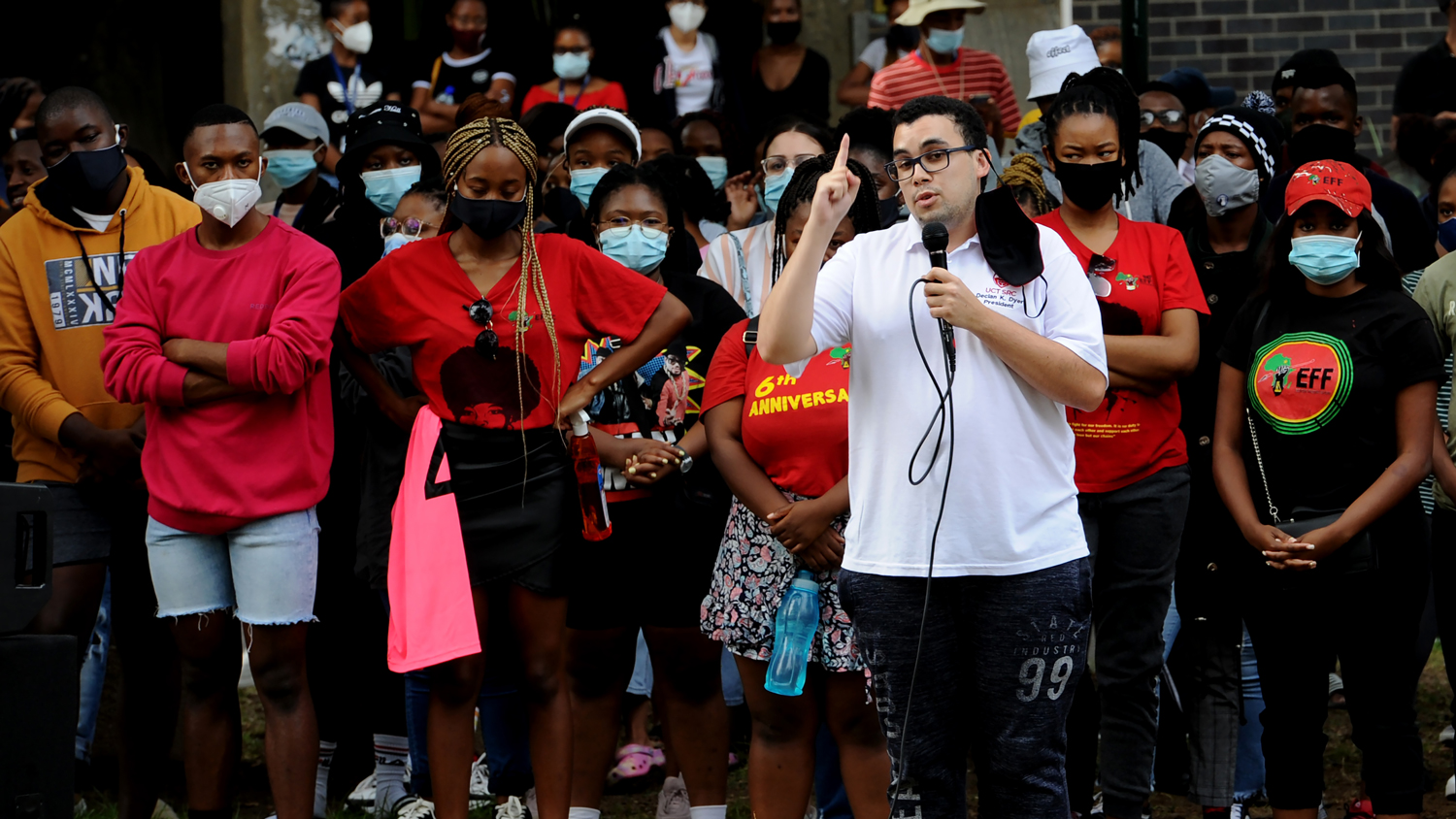Governance
04 November 2022
Effective governance clearly maps out pathways to achieving transformation, inclusivity and diversity at UCT. Governance structures, such as the UCT Transformation Forum, continued to function online in 2021.
In making sense of the relationship between governance structures and TDI actions and initiatives, it’s important to acknowledge two factors:
Firstly, student activists, like the two referred to in the images above or the video cited in the previous section, have highlighted how bureaucratic frameworks of governance continue to reproduce colonial and racist hierarchies which do not benefit people of colour, womxn, foreign nationals or queer and trans persons (Xaba, 2018). This argument aims to trouble the assumption that frameworks and practices, in the form of committees and working groups (in contrast to social movements and direct actions) are better or more effective at leading to transformation changes. It is only through uniquely curated programmes, offered by some departments, that students are involved in the conceptualisation of transformation, diversity and inclusion programmes in the university.
Secondly, scholars like Kessi et al. (2021), argue that the hierarchies implicit within the university are structures to reinforce particular norms and values. These hierarchical norms and values are arguably complicit in colonial, racist and cisnormative and heteropatriarchal ways of doing and being. In both cases, it’s important to acknowledge the systems of power at play within governance structures and to position TDI work as not only seeking to operate within these structures, but to transform them.
“Academics are trained within academic disciplines, such that in even small ways we tend to reproduce knowledge value systems that maintain our positions (and vice versa). The networks of scholars, their predecessors, and ultimately, their students become norm enforcers, rewarding the epistemic, methodologic, and even substantive standards for what is studied and how it is packaged.” – Kessi, Marks, & Ramugondo, 2021.
Engagement with institutional governance structures
The primary function of the university is to produce research and the provision of quality education in teaching and learning. The logic follows, that the primary functions of the university should therefore include transformation, diversity and inclusion indicators in research, teaching and learning, and the operations of the university. Currently this linkage with the primary objectives for the research, teaching and learning is to some extent silent. This finding is not unique to UCT. Nationally, the higher education Transformation Forum notes the apathy and distancing between transformation benchmarks and the academic project.
The statutory oversight of transformation remains within the Institutional Forum (IF), which advises Council on transformation-related matters. The work of the IF and the academic and research functions of the university remain siloed. Arguably, the work of transformation is taking place much lower down in the hierarchies of power, within the TF and the EEF. Most transformation committee chairpersons and deputy chairpersons participate in TF and EEF spaces. In faculties with deputy deans for transformation, the deputy dean sometimes participates in governance spaces such as Senate or the Teaching and Learning Committee. A small number of transformation committee representatives participate in policy working groups or committees such as the Naming of Buildings Committee (NoBC), the Works of Arts Collection (WOAC) committee, Language Policy Committee, Religious Observances Task Team and the UCT Skills Development Committee.
Several non-academic departments stated that they felt isolated from institutional governance structures and had no way to access these structures directly. Some faculties reported that even when there are representatives on Senate, a few voices dominate the space and transformation issues are not often foregrounded.
In contrast to previous years, several more transformation committee representatives report being included in their faculty or departmental management structure. For example, in the Faculty of Health Sciences, the transformation officer was located at the deanery, and in IAPO and HR steps were taken to include transformation committee members in the departmental management meetings.
- The Transformation Forum and Employment Equity Forum are the primary governance structures for transformation committees. They hosted four regular sessions in 2021. During the year, transformation committee chairpersons initiated a separate meeting space with the Acting DVC for Transformation Student Affairs and Social Responsiveness to raise issues and concerns directly. This became a regular platform for direct engagements.
- The DVC continued to hold secretariat for the Inclusivity Strategy Advisory Group (ISAG) in 2021. The ISAG provided a cross-functional and multidisciplinary platform for the implementation of the Inclusivity Strategy. The Inclusivity Strategy describes the institutional programmes the university will implement in order to respond to the findings of the Inclusivity Survey.
Themes emerging in relation to governance structures:
- While almost all entities reported an increased interest in and attempts at including students in entity-specific governance structures, students are still not meaningfully integrated into governance structures. Where they are integrated, their voices reportedly don’t have influence or aren’t taken seriously, with meetings often clashing with learning responsibilities.
- While many governance structures are striving to be more inclusive, pay class (or more accurately classism) continues to play a role in who gets to participate in governance structures, how their voices are heard, or how seriously they are taken. It’s important to improve inclusion and enablement of the voices of staff members from lower pay classes.
| Where are the student voices in governance structures and strategy development? And conversely, where is transformation, diversity and inclusion in student activism and student-led strategies for change? Faculty and departments reported that transformation, diversity and inclusion work is often absent of student- informed strategy for change. Even this report reflects mostly the work of staff contributors, and is silent on the work of the SRC Advocacy, Student Parliament, Residence Transformation Committees and Faculty Student Council work. The decoupling of the institutional TDI efforts and student activism is a notable concern that has to be addressed as UCT metamorphosises into its Vision 2030. For this report and the benchmarks which underpin it to be effective, student voices need to be more meaningfully and authentically heard and amplified. |

| “Governance structures could be held accountable through robust monitoring, review and evaluation mechanisms.” |
| “There are a number of places where the communication lines between transformation committees and governance structures are unclear at best or broken at worst. Some of these issues have recently been dealt with, such as TF representation on the Institutional Forum, but many issues remain.” |
In locating TDI agency within the UCT governance context, it’s important not to treat TDI issues or representatives as tokens. Tokenism, in this case, would refer to attempting to include individuals or content into already hierarchical or exclusionary structures or processes. Rather, TDI should also be appreciated for its catalysing or metamorphosising characteristics. This would allow the presence of TDI agents and themes to propose changing the approach, structure and functioning of governance mechanisms, hopefully leading these mechanisms to be more inclusive, effective and socially just.
 This work is licensed under a Creative Commons Attribution-NoDerivatives 4.0 International License.
This work is licensed under a Creative Commons Attribution-NoDerivatives 4.0 International License.
Please view the republishing articles page for more information.






